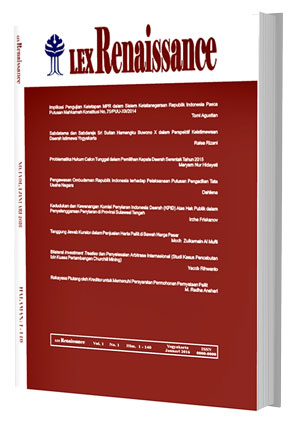Main Article Content
Abstract
This study aims to determine the objective conditions regarding the legal politics of managing the performance accountability of regional heads after the reform. The formulations of the problem include, first, how is the legal politics of the regulation for performance accountability of regional heads after the reform, and second, what is the ideal model of regional head accountability to the regional representative council (DPRD). This research is normative juridical research in which the data used is secondary data in the form of legal materials. In addition, this study uses theories as an analysis tool. The results show that the legal politics of regional head accountability has shifted from DPRD to the central government. The shift is caused by an empirical practice during the enactment of Law No. 22 of 1999 and the domination of DPRD, but the accountability is then shifted to the central government. Domination is also shown by the central government in supervising regional governments, thus minimizing the role of DPRD as a regional representative body with supervisory function. The performance accountability of regional head should be initially presented to DPRD to create equal partnership relations between the two institutions and to place DPRD outside the regional administration element, enabling DPRD to carry out the supervisory function optimally towards directly elected regional heads.
Keywords: Legal politics; accountability; regional heads
Article Details
Authors who publish with this journal agree to the following terms:
a. Authors retain copyright and grant the journal right of first publication with the work simultaneously licensed under a Creative Commons Attribution License that allows others to share the work with an acknowledgement of the work's authorship and initial publication in this journal.
b. Authors are able to enter into separate, additional contractual arrangements for the non-exclusive distribution of the journal's published version of the work (e.g., post it to an institutional repository or publish it in a book), with an acknowledgement of its initial publication in this journal.
c. Authors are permitted and encouraged to post their work online (e.g., in institutional repositories or on their website) prior to and during the submission process, as it can lead to productive exchanges, as well as earlier and greater citation of published work (See The Effect of Open Access).



